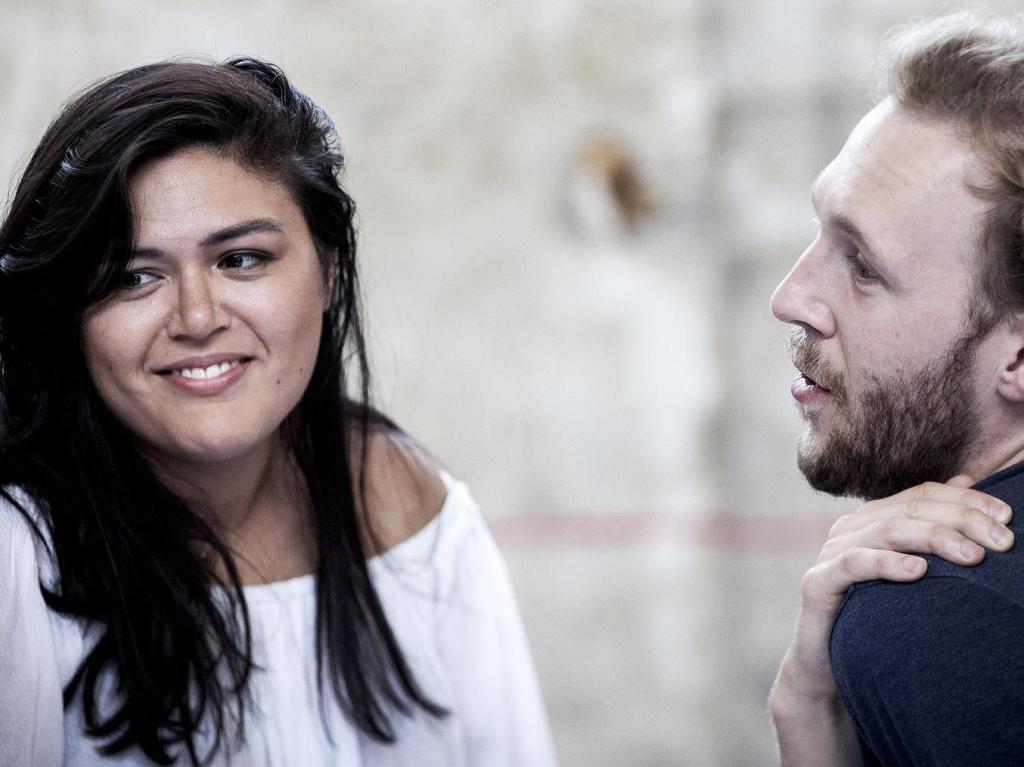Nakkiah Lui and Sam O’Sullivan while rehearsing for Kill the Messenger (Credit: Brett Boardman)
Having won acclaim and awards for her first production This Heaven, lawyer, playwright, actor and writer Nakkiah Lui is set to bring to Belvoir her second play, Kill the Messenger, which is a fictionalised account of real-life events that she was witness to, including the death of her grandmother.
‘One of the big themes of the play is why do we present stories of black suffering, and what are the parallels between the themes of institutionalised racism and the ways in which we present the black theatre canon,’ said Lui.
Associate Director at Belvoir Anthea Williams said that Lui’s powerful and emotionally charged play is one of the most exciting and innovative pieces of new writing that she has read in a very long time.
‘Generally the pieces deal with institutionalised racism, but the play also deals with why we write, why we make theatre, why do we go to the theatre and what we are hoping to achieve by doing that.’
Lui, who plays herself in the production, and actually auditioned for the role feels that her training as a lawyer helps her writing, because ultimately both require an absence of making a judgement about a character/person.
One of the stories in the play is about a young man in Lui’s home suburb of Mount Druitt. He went into a hospital in a lot of pain, but was not taken seriously because he was a drug user and so was refused medication. He hanged himself and it was found out later that he had quite severe cancer.
‘So this was someone who was a drug addict, and was Indigenous, but ultimately deserved help, everyone deserves help.
‘And it’s that little judgement that was made about him, that pushed him to the bottom of the list and he died as a consequence of that,’ said Lui.
Lui believes that racism is a very layered and complex thing: it isn’t just not wanting to sit next to a black man in a bus, but it’s in the way it is set up in society.
‘It’s ingrained within the institutions of Australia and very small judgements that we never question, can actually have quite devastating consequences.
‘I think a lot of confusion about our national identity and what Australia is, is because we haven’t addressed the past,’ added Lui.
Williams agrees with Lui, ‘I think we are a country that is uncomfortable with racism and also with the past.
‘We try to deal with the past by ignoring it, by saying that it was in the past, but actually you can’t affect the past – it always impacts upon the present,’ she said.
Kill the Messenger is a tragedy, but it’s written with a lot of humour and wit. But how does one write about an issue like racism using comedy as a tool? Lui, who is known for her work on ABC’s Black Comedy, says humour is a really great way to engage with an audience.
‘I think if you can make an audience member laugh, you’re letting them in and it’s a much quicker way to have a connection with your audience.’
The work also explores Lui’s own journey with writing the play and is an interrogation into its form and structure. It sees Lui inhabit a fictional world of the play and a non-fictional reality at the same time.
Williams says that the way these various worlds impact upon each other in the process of writing is particularly unique.
‘Nakkiah sometimes speaks directly to the audience, while the other characters in the play never speak to the audience and always occupy a fictional world.
‘You get to have a specific relationship with the writer, and how and why she has written the play,’ added Williams.
Although, Lui warns that she comes bearing no solutions, ‘I directly talk to the audience, and tell them that, “I don’t have answers for you. But I just want to tell you about these people who existed and that this happened and we were all complicit in it by the fact that we all agree to be members of this society,”’ she said.
But it must feel great being called the ‘game-changer’ of Indigenous theatre. Lui feels it’s a bit of a double-edged sword.
‘It’s an amazing compliment but at the same time I think when we talk about the Indigenous canon we are really talking about the Australian canon. Aren’t we?
‘I am an Aboriginal woman, and an Aboriginal theatre-maker and of course, I care very much about my community, but I am also heavily invested in studying race, class, gender, politics and political relationships within Australia.
‘But I guess when we talk about Indigenous theatre we are really talking about it’s relationship to the centre, which is white theatre,’ added Lui.
With her work, Lui looks for an opportunity to change what black theatre can be, because she believes the demographic of Australia is changing.
‘This idea of Australia being middle-class, rich, white Anglo-Saxon ode-to-the-British-monarchy is not the Australia that I grew up in, and it’s not the Australia that I see.
‘So if it’s white versus black, then I see that the black canon has an amazing opportunity to encompass that growing demographic, which sits outside of the centre,’ she added.
Kill the Messenger opens at Belvoir on 14 February 2015 for a 3-week run playing till 8 March 2015 only. To book tickets visit the company website.





